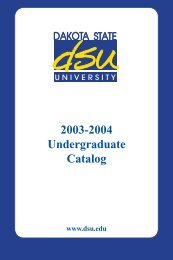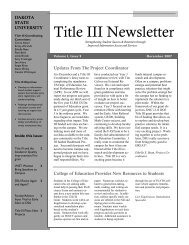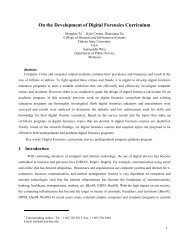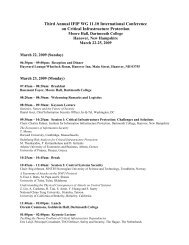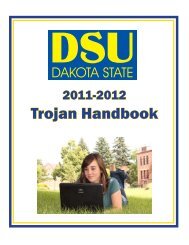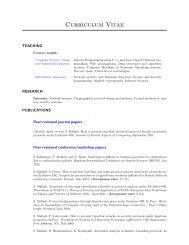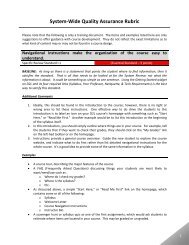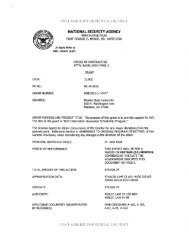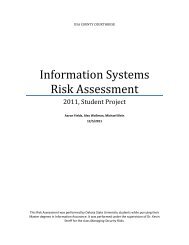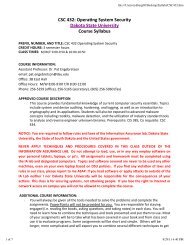Academic Calendar – Fall 2012 - Dakota State University
Academic Calendar – Fall 2012 - Dakota State University
Academic Calendar – Fall 2012 - Dakota State University
Create successful ePaper yourself
Turn your PDF publications into a flip-book with our unique Google optimized e-Paper software.
Appendix A (Alcohol and Other Drugs)<br />
Family Educational Rights and Privacy Act (FERPA)<br />
The following outlines the federal law, FERPA. All information was taken from the U.S. Department of Education website and is available at<br />
http://www.ed.gov/policy/gen/guid/fpco/ferpa/index.html and http://www.ed.gov/policy/gen/guid/fpco/hottopics/ht-parents-postsecstudents.html<br />
The Family Educational Rights and Privacy Act (FERPA) (20 U.S.C. § 1232g; 34 CFR Part 99) is a Federal law that protects the privacy of<br />
student education records. The law applies to all schools that receive funds under an applicable program of the U.S. Department of Education.<br />
FERPA gives parents certain rights with respect to their children’s education records. These rights transfer to the student when he or she reaches<br />
the age of 18 or attends a school beyond the high school level. Students to whom the rights have transferred are “eligible students.”<br />
• Parents or eligible students have the right to inspect and review the student’s education records maintained by the school. Schools are not<br />
required to provide copies of records unless, for reasons such as great distance, it is impossible for parents or eligible students to review the records.<br />
Schools may charge a fee for copies.<br />
• Parents or eligible students have the right to request that a school correct records which they believe to be inaccurate or misleading. If the<br />
school decides not to amend the record, the parent or eligible student then has the right to a formal hearing. After the hearing, if the school still<br />
decides not to amend the record, the parent or eligible student has the right to place a statement with the record setting forth his or her view about<br />
the contested information.<br />
• Generally, schools must have written permission from the parent or eligible student in order to release any information from a student’s<br />
education record. However, FERPA allows schools to disclose those records, without consent, to the following parties or under the following<br />
conditions (34 CFR § 99.31):<br />
Schools may disclose, without consent, “directory” information such as a student’s name, address, telephone number and dates of attendance.<br />
However, schools must tell parents and eligible students about directory information and allow parents and eligible students a reasonable amount<br />
of time to request that the school not disclose directory information about them. Schools must notify parents and eligible students annually of their<br />
rights under FERPA. The actual means of notification (special letter, inclusion in a PTA bulletin, student handbook, or newspaper article) is left<br />
to the discretion of each school.<br />
Disclosure of Information from Education Records to Parents of Students Attending Postsecondary Institutions<br />
What are parents’ and students’ rights under FERPA?<br />
At the K-12 school level, FERPA provides parents with the right to inspect and review their children’s education records, the right to seek<br />
to amend information in the records they believe to be inaccurate, misleading, or an invasion of privacy, and the right to consent to the disclosure<br />
of personally identifiable information from their children’s education records. When a student turns 18 years old or enters a postsecondary<br />
institution at any age, these rights under FERPA transfer from the student’s parents to the student. Under FERPA, a student to whom the rights<br />
have transferred is known as an “eligible student.” Although the law does say that the parents’ rights afforded by FERPA transfer to the “eligible<br />
student,” FERPA clearly provides ways in which an institution can share education records on the student with his or her parents. While concerns<br />
have been expressed about the limitations on the release of information, there are exceptions to FERPA’s general rule that educational agencies<br />
and institutions subject to FERPA may not have a policy or practice of disclosing “education records” without the written consent of the parent (at<br />
the K-12 level) or the “eligible student.”<br />
When may a school disclose information to parents of dependent students?<br />
Under FERPA, schools may release any and all information to parents, without the consent of the eligible student, if the student is a dependent<br />
for tax purposes under the IRS rules.**<br />
Can a school disclose information to parents in a health or safety emergency?<br />
The Department interprets FERPA to permit schools to disclose information from education records to parents if a health or safety emergency<br />
involves their son or daughter.<br />
Can parents be informed about students’ violation of alcohol and controlled substance rules?<br />
Another provision in FERPA permits a college or university to let parents of students under the age of 21 know when the student has violated<br />
any law or policy concerning the use or possession of alcohol or a controlled substance.<br />
Can a school disclose law enforcement unit records to parents and the public?<br />
Additionally, under FERPA, schools may disclose information from “law enforcement unit records” to anyone <strong>–</strong> including parents or federal,<br />
<strong>State</strong>, or local law enforcement authorities <strong>–</strong> without the consent of the eligible student. Many colleges and universities have their own campus<br />
security units. Records created and maintained by these units for law enforcement purposes are exempt from the privacy restrictions of FERPA<br />
and can be shared with anyone.<br />
Can school officials share their observations of students with parents?<br />
Nothing in FERPA prohibits a school official from sharing with parents information that is based on that official’s personal knowledge or<br />
observation and that is not based on information contained in an education record. Therefore, FERPA would not prohibit a teacher or other school<br />
official from letting a parent know of their concern about their son or daughter that is based on their personal knowledge or observation.<br />
How does HIPAA apply to students’ education records?<br />
The Health Insurance Portability and Accountability Act of 1996 (HIPAA) is a law passed by Congress intended to establish transaction,<br />
security, privacy, and other standards to address concerns about the electronic exchange of health information. However, the HIPAA Privacy Rule<br />
excludes from its coverage those records that are protected by FERPA at school districts and postsecondary institutions that provide health or<br />
medical services to students. This is because Congress specifically addressed how education records should be protected under FERPA. For this<br />
reason, records that are protected by FERPA are not subject to the HIPAA Privacy Rule and may be shared with parents under the circumstances<br />
described above.<br />
**DSU maintains a narrow interpretation of the FERPA guidelines since “dependent tax status” is not readily available to the university.<br />
Additional questions or clarifications regarding FERPA should be directed to Sandy Anderson, DSU Registrar, at 605-256-5144.<br />
54<br />
• School officials with legitimate educational interest • Other schools to which a student is transferring<br />
• Specified officials for audit or evaluation purposes • Appropriate parties in connection with financial aid to a student<br />
• Organizations conducting certain studies for or on behalf of the school • Accrediting organizations<br />
• To comply with a judicial order or lawfully issued subpoena • Appropriate officials in cases of health and safety emergencies<br />
• <strong>State</strong> and local authorities, within a juvenile justice system, pursuant to specific <strong>State</strong> law



